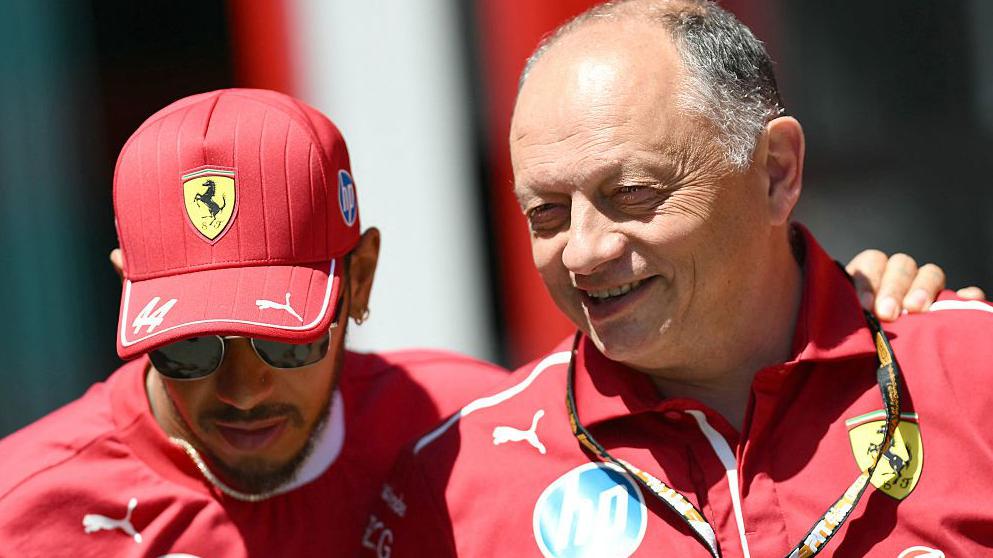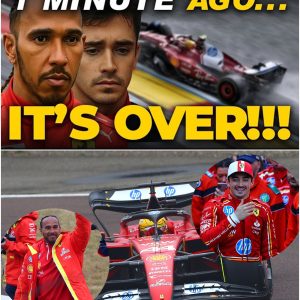The Formula 1 world has been rocked by drama in recent weeks, with a particularly sharp focus on Ferrari’s internal struggles.
A candid admission by team principal Frédéric Vasseur has intensified the scrutiny surrounding the team’s performance in 2025, particularly with the arrival of seven-time world champion Lewis Hamilton.
His transition from Mercedes to Ferrari, accompanied by high expectations, has not gone smoothly. Vasseur’s public acknowledgment that he and Hamilton may have underestimated the challenge of adapting to Ferrari has sparked a crisis that could have long-lasting effects on both the team and the driver.
This drama isn’t just a minor bump in the road; it could signal the beginning of the end for Ferrari’s ambitions to reclaim its place at the top of the sport.

The Arrival of Hamilton at Ferrari: Expectations vs Reality
When Hamilton made the bold switch from Mercedes to Ferrari, fans and pundits alike were filled with anticipation. Hamilton’s arrival in Maranello was seen as a new chapter for the legendary team, with a proven world champion now behind the wheel of the SF25. With over a decade of experience at Mercedes, including multiple world championships, the expectation was that Hamilton would quickly adapt to Ferrari’s ways and challenge for victories. His reputation preceded him, and there was a palpable sense of excitement when the 2025 season began.
However, the reality on the track has been much different. Despite some promising moments, such as a sprint race victory at the Chinese Grand Prix, Hamilton has struggled to match the performances of his teammate, Charles Leclerc. While Hamilton’s talent is undeniable, adapting to Ferrari has proven more difficult than expected. The driving styles of Hamilton and Leclerc are vastly different, and Leclerc’s consistency in extracting the most from the SF25 has seen him consistently outscore Hamilton. While Hamilton has had occasional flashes of brilliance, the overall standings tell a different story. He has trailed Leclerc for most of the season, and the disparity in performance between the two drivers has created an undercurrent of tension within the team.
Vasseur’s Admission and Its Impact on Ferrari
Frédéric Vasseur’s recent comments to F1.com have only added fuel to the fire. In a candid admission, Vasseur conceded that he and Hamilton might have underestimated the challenges that come with transitioning to a new team after such a long period with Mercedes. He acknowledged that the culture, people, software, and car characteristics at Ferrari were drastically different from what Hamilton had been accustomed to at Mercedes. Vasseur’s statement has not only exposed a flaw in Ferrari’s strategy but also amplified the internal pressure on Hamilton and the team.
“I’ve been in the Mercedes environment for almost 20 years… everything is different now. Maybe Lewis and I both underestimated this,” Vasseur said. Although he pointed out that Hamilton had started to regain his form in the latter part of the season, Vasseur’s words were a stark reminder of the challenges ahead. The second half of the season will be critical for Ferrari as they attempt to turn things around. Will Hamilton rise to the occasion, or will the internal power dynamics favor Leclerc? The answers to these questions could determine the future of Ferrari’s Formula 1 program.

The Hungarian Grand Prix: A Low Point for Hamilton
If there was any race that encapsulated the struggles of Hamilton at Ferrari, it was the Hungarian Grand Prix. A disastrous weekend, both on and off the track, revealed the fragile state of his relationship with his new team. A crash in qualifying saw him fail to progress past Q2, leaving him with only 12th place on the grid. Any hopes of a comeback in the race were dashed as he finished in the same position, unable to make any significant progress.
Hamilton’s frustration boiled over in the aftermath, where he emotionally labeled himself as “useless” and even suggested that Ferrari might be better off finding another driver. “When you have feelings, you have feelings,” he said, hinting at the internal tensions brewing behind the scenes at Maranello. His refusal to attend the steward’s hearing after his incident with Max Verstappen only added to the sense of discontent. Martin Brundle, a former F1 driver, expressed his concern, noting that Hamilton appeared “listless and depressed” throughout the weekend. The situation at Ferrari had clearly taken a toll on one of the sport’s greatest drivers.
Leclerc’s Struggles: A Parallel Story of Frustration
While Hamilton has had his own set of challenges, Charles Leclerc has not been immune to frustration either. Despite showing excellent speed, particularly in the Hungarian Grand Prix, Leclerc has been let down by Ferrari’s inability to execute strategies effectively. In Hungary, Leclerc started from pole position, a clear indication of Ferrari’s potential to challenge Red Bull on a circuit where overtaking is difficult. However, his race was compromised by a slow pit stop, followed by a penalty for speeding in the pit lane. Leclerc’s disappointment was palpable as he lamented the missed opportunity: “We should have won today, but we lost everything.”
Leclerc’s struggles go beyond strategy. Since Hamilton’s arrival, the team’s internal dynamics have shifted, and Leclerc has had to juggle his role as Ferrari’s lead driver with the pressures of sharing the garage with one of Formula 1’s most iconic figures. The media scrutiny, coupled with the team’s internal politics, has magnified every mistake. At a time when Ferrari needed to be at its best, these constant errors have cost Leclerc valuable points, adding to his growing frustration.

The Internal Tensions and Pressure Mounting on Ferrari
The combination of Hamilton’s struggles, Leclerc’s frustration, and Ferrari’s operational errors has created an atmosphere of tension at Maranello. Rather than seeing Hamilton and Leclerc as a dynamic duo capable of challenging Red Bull, Ferrari now faces the reality of having two highly talented drivers who are unable to work together effectively. The car’s sensitivity to weather and track conditions, along with strategic misfires, have prevented Ferrari from fully unleashing the potential of their lineup.
As the team’s internal strife deepens, the pressure is only increasing. Toto Wolff, the Mercedes team principal and Hamilton’s former boss, weighed in on the situation. Wolff suggested that the challenges at Ferrari go beyond technical issues and are deeply rooted in the internal dynamics of the team. “The pressure comes not only from within the team but also from all of Italy, the media, the tifosi, and the internal politics. They’re walking on a knife’s edge,” Wolff said. He emphasized that Ferrari must quickly find a way to balance the needs of Hamilton and Leclerc, or the season could spiral into a disaster.
Looking Ahead: The Crucial Second Half of the Season
Despite the mounting pressure, both Hamilton and Leclerc have vowed to turn things around. Hamilton, refusing to be defeated, emphasized that the fight is far from over. “Don’t underestimate me. The fight isn’t over,” he declared. Leclerc, on the other hand, has urged Ferrari to fix its operational errors quickly, warning that they cannot afford to lose any more points. “We can’t afford to lose points like this again. Otherwise, the championship opportunity will be lost,” he said.
As the team prepares for the second half of the season, the focus will not just be on who is the fastest on the track. It will be a test of who can handle the mounting pressure and rise above the internal strife. In Ferrari’s history, there’s only one principle: win, or fade into obscurity. The upcoming races, starting with the Dutch Grand Prix, will be pivotal in determining whether Hamilton and Ferrari can salvage their season or whether their hopes will be dashed once again.
In the world of Formula 1, the road to redemption is never easy. For Ferrari, the stakes have never been higher. The next few months will determine whether this season will be remembered as a missed opportunity or a step toward a new era of dominance. As the battle intensifies, the world will be watching closely.





